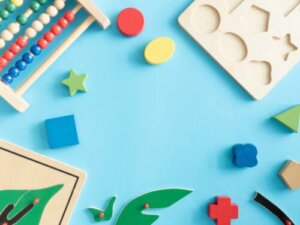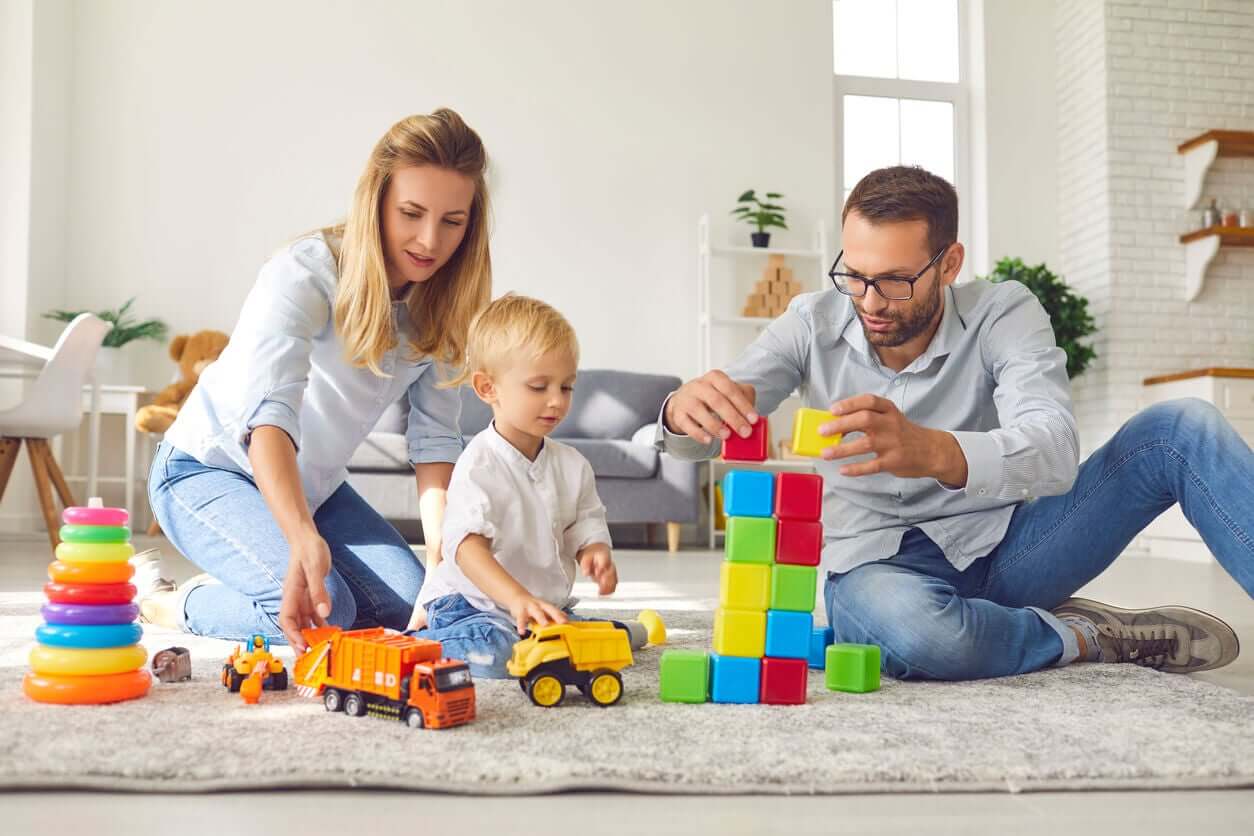The Best Toys to Improve Psychomotor Skills for Babies


Written and verified by the psychopedagogue María José Roldán
If you’re a father or mother, you’ll want to choose the best toys for your little one, so that, in addition to providing entertainment, they also improve psychomotor skills for babies.
Through play and with the help of certain elements you’ll be able to work the sensitive, representative, symbolic, and perceptual capacities of your little one. Take note of these recommendations!
The psychomotor skills of babies
Before going straight to the recommendations, you need to know the two types of motor skills that exist: Gross and fine.
Gross motor skills
When we talk about it, we’re referring to the large movements of the human body. These involve the various muscle groups in the legs, arms, head, abdomen, and back. Some examples include walking, jumping, or running.
Through this type of motor skills, children express themselves with great freedom. But, at the same time, a high level of development of this domain is required to be able to play, walk, move, or explore.
Fine motor skills
In this case, we’re referring to those more precise movements, which involve the muscles of the hands, face, or feet. The main actions are related to the manipulation of objects, and to execute them, a certain maturity of the central nervous system is required.
You may be interested in: How to Boost the Development of Fine Motor Skills in Babies
Encourage the development of your baby’s psychomotor skills
Now that you know a little more about what we’re talking about, it’s time to explain to you the importance of stimulating the development of psychomotor skills in babies. For this, some toys are used and activities specially designed for this purpose are carried out.
It’s essential to take into account the age of the baby, as well as their personal abilities. Remember that each child is unique and that they develop at their own pace.
For example, for the first months of life, objects with bright colors or with different textures and shapes are ideal. As the child grows, other types of toys can be included to suit the baby. Not all babies have the same preferences or have fun in the same way.

It’s not just about buying toys…
Although objects help stimulate children in their maturation process, no toy is enough. In fact, we, as parents, are when ones who perfect the activity.
The interaction between the child and their caregivers is the best engine for their optimal development.
Of course, within the toy options that are available, there are some that are better than others. There are those that encourage creativity, those that help improve hand-eye coordination, or those that stimulate language. You must choose the one that best suits the stage of growth and the interests of your child.
The best toys to improve psychomotor skills, according to the baby’s age
Now we’re going to focus on the toys that serve to stimulate the baby’s psychomotricity, and we’ll share them according to age.
0 to 6 months
At this age, your baby needs toys that allow them to discover the colors, textures, and shapes of objects and their own body.
Ideally, these should be large items and be light enough to handle. Another useful feature is that they emit sounds, like those that contain bells or cellophane inside.
Good examples are activity mats, rattles, chew toys, or sensory balls.
From 7 to 12 months
At this stage, little ones already have a certain stability and autonomy when it comes to controlling their movements and positions. For this reason, they may enjoy playing on a teeter-totter or dragging around objects with colors, lights, and textures.
Toys with lights and sounds still get their attention, especially those that make noise when you throw them.
From 13 to 18 months
During these months, free movement is the focus of play. With this in mind, ride-on cars are a hit.
Stacking cubes and building blocks made of lightweight, oversized materials are good options for stimulating fine motor skills.
From 19 to 24 months
At this age, children enhance the development of touch, hand-eye coordination, and begin to use their imagination.
In this sense, bicycles, dolls, finger paintings, cars, construction games, and puzzles are highly recommended options.

The quality of the toys does matter!
Whenever you buy toys to improve your baby’s psychomotor skills, you must take quality into account. Make sure that the materials are suitable, resistant, and that they don’t contain any type of toxic chemicals among their components. Likewise, make sure that they don’t include small pieces that can be accidentally ingested.
This way, you avoid putting your baby’s health at risk and clear your mind of worries in order to focus 100% on having fun.
If you’re a father or mother, you’ll want to choose the best toys for your little one, so that, in addition to providing entertainment, they also improve psychomotor skills for babies.
Through play and with the help of certain elements you’ll be able to work the sensitive, representative, symbolic, and perceptual capacities of your little one. Take note of these recommendations!
The psychomotor skills of babies
Before going straight to the recommendations, you need to know the two types of motor skills that exist: Gross and fine.
Gross motor skills
When we talk about it, we’re referring to the large movements of the human body. These involve the various muscle groups in the legs, arms, head, abdomen, and back. Some examples include walking, jumping, or running.
Through this type of motor skills, children express themselves with great freedom. But, at the same time, a high level of development of this domain is required to be able to play, walk, move, or explore.
Fine motor skills
In this case, we’re referring to those more precise movements, which involve the muscles of the hands, face, or feet. The main actions are related to the manipulation of objects, and to execute them, a certain maturity of the central nervous system is required.
You may be interested in: How to Boost the Development of Fine Motor Skills in Babies
Encourage the development of your baby’s psychomotor skills
Now that you know a little more about what we’re talking about, it’s time to explain to you the importance of stimulating the development of psychomotor skills in babies. For this, some toys are used and activities specially designed for this purpose are carried out.
It’s essential to take into account the age of the baby, as well as their personal abilities. Remember that each child is unique and that they develop at their own pace.
For example, for the first months of life, objects with bright colors or with different textures and shapes are ideal. As the child grows, other types of toys can be included to suit the baby. Not all babies have the same preferences or have fun in the same way.

It’s not just about buying toys…
Although objects help stimulate children in their maturation process, no toy is enough. In fact, we, as parents, are when ones who perfect the activity.
The interaction between the child and their caregivers is the best engine for their optimal development.
Of course, within the toy options that are available, there are some that are better than others. There are those that encourage creativity, those that help improve hand-eye coordination, or those that stimulate language. You must choose the one that best suits the stage of growth and the interests of your child.
The best toys to improve psychomotor skills, according to the baby’s age
Now we’re going to focus on the toys that serve to stimulate the baby’s psychomotricity, and we’ll share them according to age.
0 to 6 months
At this age, your baby needs toys that allow them to discover the colors, textures, and shapes of objects and their own body.
Ideally, these should be large items and be light enough to handle. Another useful feature is that they emit sounds, like those that contain bells or cellophane inside.
Good examples are activity mats, rattles, chew toys, or sensory balls.
From 7 to 12 months
At this stage, little ones already have a certain stability and autonomy when it comes to controlling their movements and positions. For this reason, they may enjoy playing on a teeter-totter or dragging around objects with colors, lights, and textures.
Toys with lights and sounds still get their attention, especially those that make noise when you throw them.
From 13 to 18 months
During these months, free movement is the focus of play. With this in mind, ride-on cars are a hit.
Stacking cubes and building blocks made of lightweight, oversized materials are good options for stimulating fine motor skills.
From 19 to 24 months
At this age, children enhance the development of touch, hand-eye coordination, and begin to use their imagination.
In this sense, bicycles, dolls, finger paintings, cars, construction games, and puzzles are highly recommended options.

The quality of the toys does matter!
Whenever you buy toys to improve your baby’s psychomotor skills, you must take quality into account. Make sure that the materials are suitable, resistant, and that they don’t contain any type of toxic chemicals among their components. Likewise, make sure that they don’t include small pieces that can be accidentally ingested.
This way, you avoid putting your baby’s health at risk and clear your mind of worries in order to focus 100% on having fun.
All cited sources were thoroughly reviewed by our team to ensure their quality, reliability, currency, and validity. The bibliography of this article was considered reliable and of academic or scientific accuracy.
- Unseld, P. (2018) Microcosmos del movimiento. Una mirada funcional al desarrollo del bebé. Editorial: Herder
- M. Costa, E. Torres, M. T. Romero, M. Fabregat, Torres, Y. Martínez, C. Mallebrera, M.J. Martínez, R. Zaragoza,P. Martínez. M. G. Millá, J. Crespo , M. C. Gabaldón, E. Richart, L. Munera, E. M. Hernández, J. García. (2008). Juego, juguetes y Atención Temprana. Pautas para el diseño de juguetes útiles en la terapia psicopedagógica. Pags 8-14 Recuperado en 23 de septiembre de 2021, de https://fundacionalpe.org/images/alpe/library/temprana/Atencin-temprana-OK.pdf
This text is provided for informational purposes only and does not replace consultation with a professional. If in doubt, consult your specialist.








